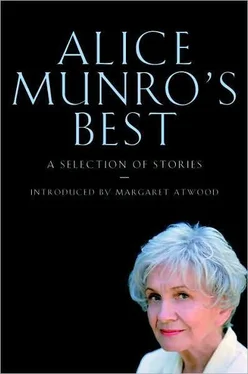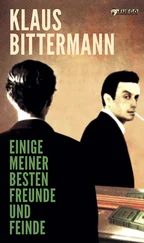THE LORD IS MY SHEPHERD
BELIEVE IN THE LORD JESUS CHRIST AND THOU SHALL
BE SAVED
Why did Flo have those, when she wasn’t even religious? They were what people had, common as calendars.
THIS IS MY KITCHEN AND I WILL DO AS I DARNED PLEASE
MORE THAN TWO PERSONS TO A BED IS DANGEROUS
AND UNLAWFUL
Billy Pope had brought that one. What would Patrick have to say about them? What would someone who was offended by a mispronunciation of Metternich think of Billy Pope’s stories?
Billy Pope worked in Tyde’s Butcher Shop. What he talked about most frequently now was the D.P., the Belgian, who had come to work there, and got on Billy Pope’s nerves with his impudent singing of French songs and his naive notions of getting on in this country, buying a butcher shop of his own.
“Don’t you think you can come over here and get yourself ideas,” Billy Pope said to the D.P. “It’s youse workin’ for us , and don’t think that’ll change into us workin’ for youse.” That shut him up, Billy Pope said.
Patrick would say from time to time that since her home was only fifty miles away he ought to come up and meet Rose’s family.
“There’s only my stepmother.”
“It’s too bad I couldn’t have met your father.”
Rashly, she had presented her father to Patrick as a reader of history, an amateur scholar. That was not exactly a lie, but it did not give a truthful picture of the circumstances.
“Is your stepmother your guardian?”
Rose had to say she did not know.
“Well, your father must have appointed a guardian for you in his will. Who administers his estate?”
His estate. Rose thought an estate was land, such as people owned in England.
Patrick thought it was rather charming of her to think that.
“No, his money and stocks and so on. What he left.”
“I don’t think he left any.”
“Don’t be silly,” Patrick said.
AND SOMETIMES Dr. Henshawe would say, “Well, you are a scholar, you are not interested in that.” Usually she was speaking of some event at the college: a pep rally, a football game, a dance. And usually she was right; Rose was not interested. But she was not eager to admit it. She did not seek or relish that definition of herself.
On the stairway wall hung graduation photographs of all the other girls, scholarship girls, who had lived with Dr. Henshawe. Most of them had got to be teachers, then mothers. One was a dietician, two were librarians, one was a professor of English, like Dr. Henshawe herself. Rose did not care for the look of them, for their soft-focused meekly smiling gratitude, their large teeth and maidenly rolls of hair. They seemed to be urging on her some deadly secular piety. There were no actresses among them, no brassy magazine journalists; none of them had latched on to the sort of life Rose wanted for herself. She wanted to perform in public. She thought she wanted to be an actress but she never tried to act, was afraid to go near the college drama productions. She knew she couldn’t sing or dance. She would really have liked to play the harp, but she had no ear for music. She wanted to be known and envied, slim and clever. She told Dr. Henshawe that if she had been a man she would have wanted to be a foreign correspondent.
“Then you must be one!” cried Dr. Henshawe alarmingly. “The future will be wide open for women. You must concentrate on languages. You must take courses in political science. And economics. Perhaps you could get a job on the paper for the summer. I have friends there.”
Rose was frightened at the idea of working on a paper, and she hated the introductory economics course; she was looking for a way of dropping it. It was dangerous to mention things to Dr. Henshawe.
SHE HAD GOT to live with Dr. Henshawe by accident. Another girl had been picked to move in but she got sick; she had t.b., and went instead to a sanatorium. Dr. Henshawe came up to the college office on the second day of registration to get the names of some other scholarship freshmen.
Rose had been in the office just a little while before, asking where the meeting of the scholarship students was to be held. She had lost her notice. The Bursar was giving a talk to the new scholarship students, telling them of ways to earn money and live cheaply and explaining the high standards of performance to be expected of them here if they wanted their payments to keep coming.
Rose found out the number of the room, and started up the stairs to the first floor. A girl came up beside her and said, “Are you on your way to three-oh-twelve, too?”
They walked together, telling each other the details of their scholarships. Rose did not yet have a place to live, she was staying at the Y. She did not really have enough money to be here at all. She had a scholarship for her tuition and the county prize to buy her books and a bursary of three hundred dollars to live on; that was all.
“You’ll have to get a job,” the other girl said. She had a larger bursary, because she was in science (that’s where the money is, the money’s all in science, she said seriously), but she was hoping to get a job in the cafeteria. She had a room in somebody’s basement. How much does your room cost? How much does a hot plate cost? Rose asked her, her head swimming with anxious calculations.
This girl wore her hair in a roll. She wore a crêpe blouse, yellowed and shining from washing and ironing. Her breasts were large and sagging. She probably wore a dirty-pink hooked-up-the-side brassiere. She had a scaly patch on one cheek.
“This must be it,” she said.
There was a little window in the door. They could look through at the other scholarship winners already assembled and waiting. It seemed to Rose that she saw four or five girls of the same stooped and matronly type as the girl who was beside her, and several bright-eyed, self-satisfied, babyish-looking boys. It seemed to be the rule that girl scholarship winners looked about forty and boys about twelve. It was not possible, of course, that they all looked like this. It was not possible that in one glance through the windows of the door Rose could detect traces of eczema, stained underarms, dandruff, moldy deposits on the teeth, and crusty flakes in the corners of the eyes. That was only what she thought. But there was a pall over them, she was not mistaken, there was a true terrible pall of eagerness and docility. How else could they have supplied so many right answers, so many pleasing answers, how else distinguished themselves and got themselves here? And Rose had done the same.
“I have to go to the john,” she said.
She could see herself working in the cafeteria. Her figure, broad enough already, broadened out still more by the green cotton uniform, her face red and her hair stringy from the heat. Dishing up stew and fried chicken for those of inferior intelligence and handsomer means. Blocked off by the steam tables, the uniform, by decent hard work that nobody need be ashamed of, by publicly proclaimed braininess and poverty. Boys could get away with that, barely. For girls it was fatal. Poverty in girls is not attractive unless combined with sweet sluttishness, stupidity. Braininess is not attractive unless combined with some signs of elegance; class. Was this true, and was she foolish enough to care? It was; she was.
She went back to the first floor where the halls were crowded with ordinary students who were not on scholarships, who would not be expected to get A’s and be grateful and live cheap. Enviable and innocent, they milled around the registration tables in their new purple-and-white blazers, their purple Frosh beanies, yelling reminders to each other, confused information, nonsensical insults. She walked among them feeling bitterly superior and despondent. The skirt of her green corduroy suit kept falling back between her legs as she walked. The material was limp; she should have spent more and bought the heavier weight. She thought now that the jacket was not properly cut either, though it had looked all right at home. The whole outfit had been made by a dressmaker in Hanratty, a friend of Flo’s, whose main concern had been that there should be no revelations of the figure. When Rose asked if the skirt couldn’t be made tighter this woman had said, “You wouldn’t want your b.t.m. to show, now would you?” and Rose hadn’t wanted to say she didn’t care.
Читать дальше












